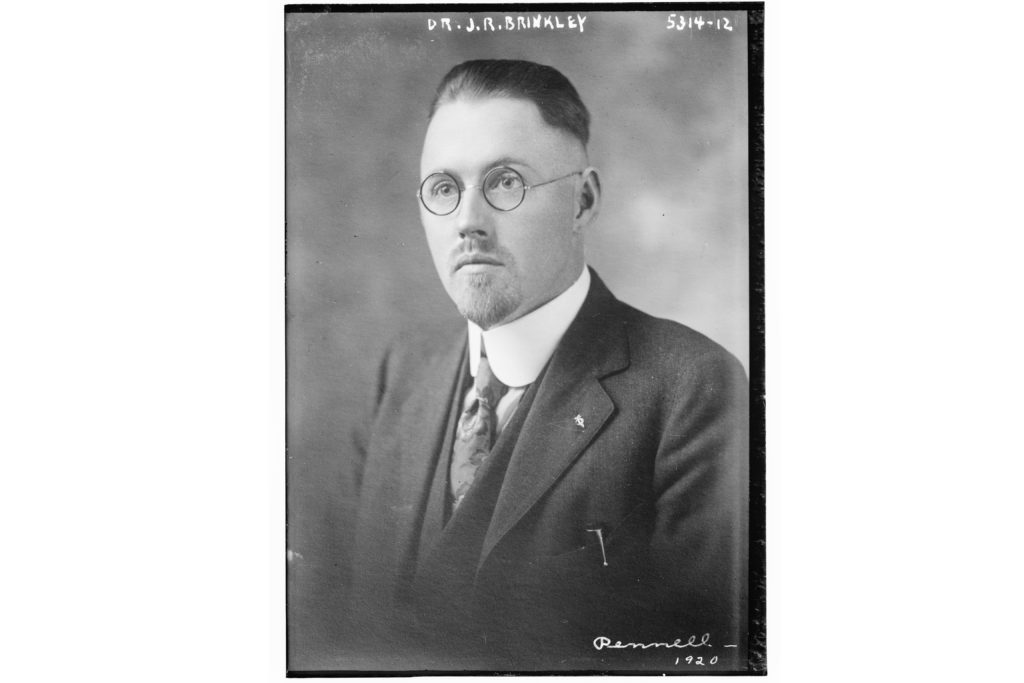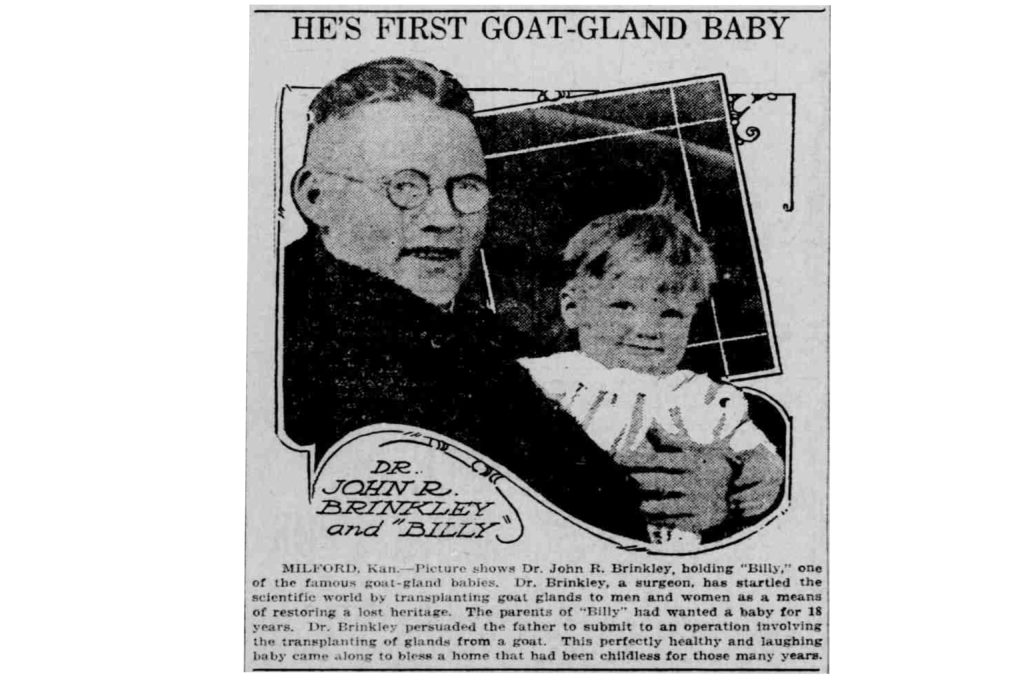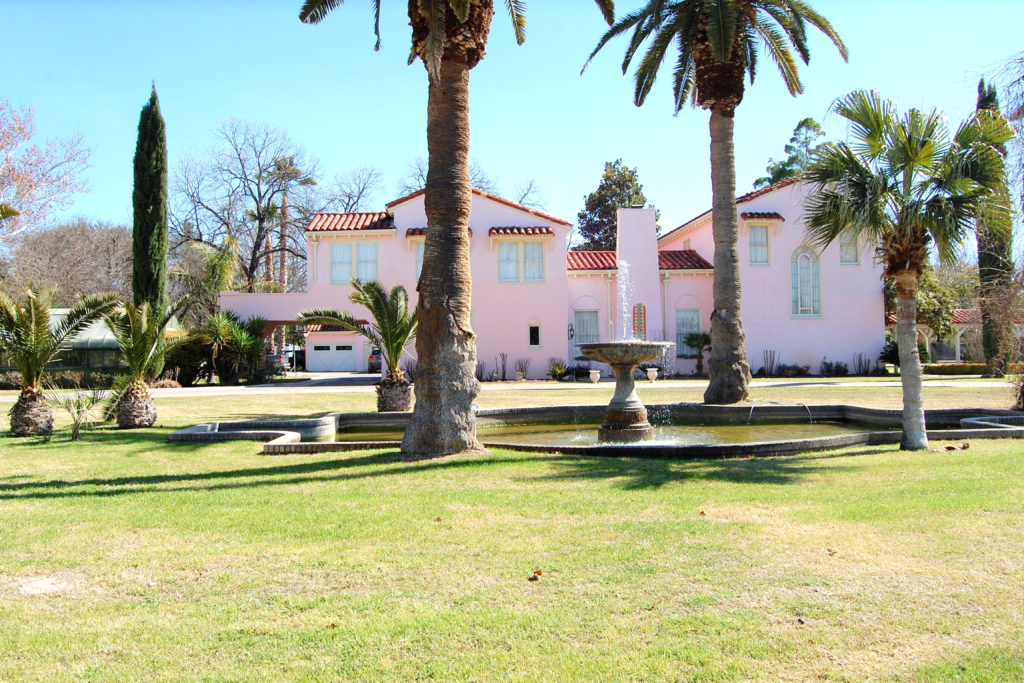Weird History: A Fake Doctor and the Dawn of Radio
On a quiet, tree-lined street a few steps from the Rio Grande River in Del Rio, Texas, a stately mansion sits forgotten by time. Set back from the street by a large yard doctored with towering palm trees and a large fountain, the Spanish revivalist building was once home to Del Rio’s most famous — and strangest — resident.
When Dr. John Brinkley lived in the home in the 1930s, the fountains were programmed to “dance” alongside colored light shows. A live organist performed on the Reuter pipe organ inside the residence, the sounds of which were blast dramatically out onto the street through loudspeakers. Curious onlookers would park their cars across the street to watch the nightly spectacle.
This was far from the strangest thing Brinkley ever did.
How such an eccentric abode wound up in little Del Rio has everything to do with the U.S.-Mexico border down at the end of the street. Brinkley moved to Del Rio in 1931 to set up a massive AM radio transmitter on the other side of the Rio Grande, in Villa Acuña, Mexico.
From his flamboyant mansion, Brinkley’s voice boomed out over the airwaves, selling the controversial elixirs, cures, and weird surgical procedures that made him both famous and a target of accusations of fraud and medical abuse. Before the law could catch up with Brinkley, however, his radio station would help shape the American popular culture, thanks to the musical programming that accompanied his snake oil salesmanship.

Humble Origins
John Romulus Brinkley was born in rural North Carolina in 1885. An orphan, he was raised by an aunt, attended a one-room grade school, and then obtained diplomas from a few dubious medical institutions that gave him his supposed credentials. For several years, Brinkley made a living as a wandering healer selling various cure-all tonics and dabbling in electricity-based procedures that lacked scientific merit. During this time, Brinkley married, had a child, divorced, kidnapped his child, fled to Canada, returned to the U.S. and remarried his ex-wife, got divorced again, and married a second wife. Brinkley’s tumultuous personal life was interrupted by World War I, during which he was called up as an Army Reservist only to be discharged after a nervous breakdown. Brinkley and his second wife landed in the tiny Milford, Kansas, after seeing an advertisement that said the rural community was looking for a town doctor.

Radio-Free Kansas
In Milford, Brinkley set up a more stable practice tending to local victims of the 1918 flu pandemic. He also began experimenting with a new procedure that would make the rural town doctor a celebrity. A patient Brinkley saw in Kansas complained of being weak and lacking virility. Brinkley claimed that he improve the issue by implanting goat glands, the patient begged him to surgically implant goat glands into him. The man paid Brinkley an exorbitant sum at the time for the procedure, and after it was complete, the doctor began advertising the service. It was a crude, often dangerous operation that often resulted in bad infections and sometimes death. But that didn’t stop patients from shelling out $750 —a little over $15,000 in today’s dollars — for the operation.
Brinkley began aggressively promoting his services, which, in no small part due to their sensational nature and claims, soon became known across the country. The American Medical Association also caught wind of Brinkley’s services and began investigating him. But that didn’t stop patients from continuing to flock to his clinic.
In 1923, Brinkley took his marketing efforts to a new level and established KFKB radio to tout his services. As the state’s medical board and law officials attempted to stop Brinkley’s practice, the quack doctor’s radio station helped boost his popularity, thanks to the eclectic mix of programming on his radio station. In between transplant advertisements, listeners were exposed to new sounds: American roots music, traditional Hawaiian songs, and early country music recordings. Brinkley was a much-wanted man — by both the law and the people.
Border Blaster
By the early 1930s, Brinkley began leveraging his popularity on the airwaves for a political career. He ran for Kansas governor, making campaign appearances alongside popular country artists whose music he played on his radio station. Brinkley failed to win office, and the state of Kansas successfully shut down his clinic, so the doctor decided to head south to Texas. The lure was a deal with the Mexican government that would allow Brinkley to set up a new radio station with a massive, 50,000-watt signal, nicknamed a “border blaster.”
Settling in Del Rio and constructing his mansion close enough to the border so that he could broadcast from Mexico without ever leaving his home, Brinkley could now advertise medical products and services out of the reach of the American authorities. Listeners, however, tuned in to hear the music of Patsy Montana, Red Foley, Gene Autry, Jimmie Rodgers, and the Carter Family. Brinkley’s massive border blaster helped establish these musicians as household names across the country.

The End of the Road
The American authorities never gave up their effort to shut Brinkley down. In 1932, Congress passed the “Brinkley Act,” which prohibited using a telephone to broadcast to a remote radio tower. Eventually, under pressure from the U.S., the Mexican government revoked Brinkley’s broadcasting license.
Brinkley’s medical practice finally ended only after he tried to sue one of his longtime critics for libel. Brinkley lost the case, with the jury finding that the doctor was, indeed, a “charlatan and quack.” Armed with that decision, dozens of lawsuits followed, and the Internal Revenue Service began an investigation for tax fraud. After filing for bankruptcy, Brinkley’s health began to fail. In 1942, Brinkley’s long and strange career came to a close when he died of heart failure.
For more little-known Texas history, uncover the origins of the Texas icehouse (and its surviving bastions where you can still get a cold drink), Texas’ claim to surfing fame (and where you can catch a manmade wave), or the rise and fall of Texas’ railroads.
© 2022 Texas Farm Bureau Insurance



